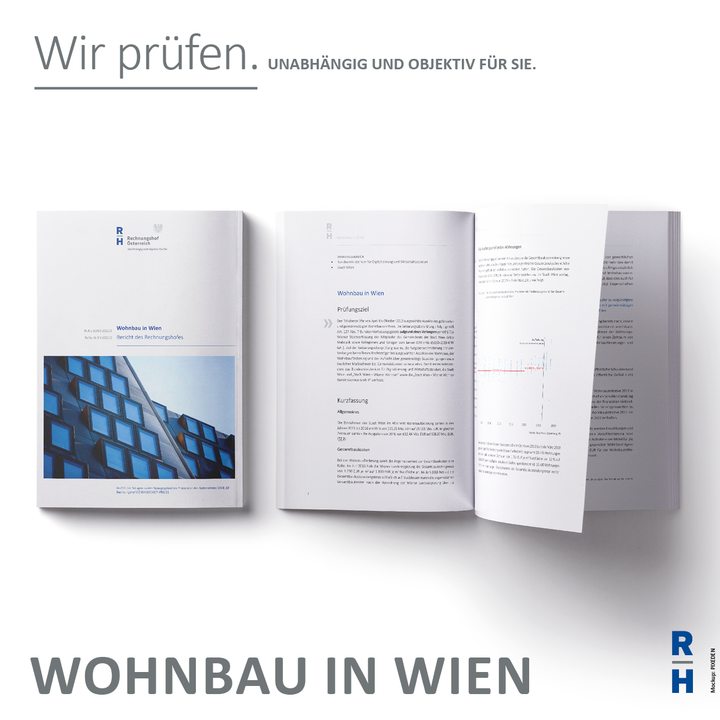Housing in Vienna

A considerable use of funds and a strong need for compliance – these are some of the aspects highlighted by the Austrian Court of Audit (ACA) in its report presented today. The ACA audited selected topics related to funded and social housing. The audit was requested by members of the Vienna City Council.
The audited period spanned the years from 2013 through 2018. Some findings also concerned previous and subsequent years.
When it comes to the construction of new building projects, adequate total construction costs are one eligibility condition for receiving subsidies. In July 2016, the Vienna provincial government increased the total construction costs deemed as adequate from a maximum of EUR 1,730 per square metres of usable area to a maximum of EUR 1,800 per square metres. In June 2018, it eventually abolished the upper limit of total costs. Instead, the adequate total construction costs had to be assessed pursuant to the regulation issued by the Vienna provincial government on the award of contracts. In its report the ACA criticizes that the regulation was not appropriate to ensure the adequacy of total construction costs. This was due to the fact that the regulation was not up-to-date at the time of the audit. Furthermore, it covered only parts of the procurement procedure and contained no upper limit up to which direct awards were permissible. The auditors therefore recommend to the city of Vienna to issue a regulation on the award of contracts for the construction of funded housing that corresponds to the current state of procurement law and to monitor compliance with the regulation for each housing project. The ACA positively notes that the city of Vienna plans to adapt the regulation to the current Austrian standard ÖNORM A 2050 as well as to the value limits of the Federal Procurement Act.
Further reduce the residential vacancy rates
The plan to render properties usable comprises construction measures taken after the return of a rented property to Wiener Wohnen (Social Housing Vienna) and prior to the re-letting of such property. The aim is to ensure a speedy re-letting of the rental property to the subsequent tenant. The ACA criticizes the increase in vacant properties by 82 per cent, concretely from 4,892 to 8,908 rental objects, from 2013 to 2017. It points to the fact that a vacant rental object creates a loss of rental revenue of EUR 4,500 per year. In 2018, however, the number of vacant properties decreased to 7,689. The ACA recommends to continue to further intensify the reduction of vacant properties and to aim for the structural vacancy, which results from construction measures and comes with 4,000 vacant rental objects.
The city of Vienna should sanction violations of the prohibition of short-term renting
In end-2018, the city of Vienna amended its building code, according to which the commercial use of an apartment in a residential zone built for short-term accommodations ceased to be permissible. Residential zones are mainly located within the Wiener Gürtel. The auditors criticize that, between the entry into force of the prohibition and June 2019, the city of Vienna prohibited the commercial short-time rental of an apartment in a residential zone only one single time. Another time, it reacted only after an indication by the ACA. The ACA points to the fact that apartments rented for a short period of time are taken off from the market and thus reduce the housing supply in the city. This can result in an increase of rent rates. The ACA recommends to the city of Vienna to consistently sanction violations of the prohibition of short-term renting in residential zones.
- pdf Datei:
- 1,316.6 KB
- Umfang:
- 120 Seiten
Report: Housing in Vienna
From April to October 2019, the ACA audited selected aspects of funded and social housing in Vienna. The audit was carried out pursuant to Article 127 para. 7 of the Federal Constitutional Law upon on a request made by Anton Mahdalik, Member of the Vienna City Council, and his colleagues according to Section 73a of the Vienna Municipal Constitution in January 2019 (file no PGL–85130–2019–KFP/GAT). The audit aimed at assessing the performance of tasks by the legal entities encompassed by the request with regard to selected aspects of housing, housing subsidies and the supervision of social housing associations as well as construction measures regarding municipal housing. This concerned in particular the Federal Ministry for Digital and Economic Affairs, the city of Vienna and the “Stadt Wien – Wiener Wohnen” as well as the “Stadt Wien – Wiener Wohnen Kundenservice GmbH”.


